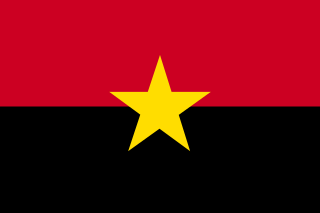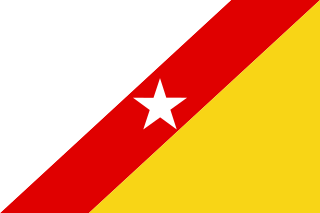Related Research Articles

The People's Movement for the Liberation of Angola, for some years called the People's Movement for the Liberation of Angola – Labour Party, is an Angolan social democratic political party. The MPLA fought against the Portuguese Army in the Angolan War of Independence from 1961 to 1974, and defeated the National Union for the Total Independence of Angola (UNITA) and the National Liberation Front of Angola (FNLA) in the Angolan Civil War. The party has ruled Angola since the country's independence from Portugal in 1975, being the de facto government throughout the civil war and continuing to rule afterwards.

António Agostinho da Silva Neto was an Angolan politician and poet. He served as the first president of Angola from 1975 to 1979, having led the Popular Movement for the Liberation of Angola (MPLA) in the war for independence (1961–1974). Until his death, he led the MPLA in the civil war (1975–2002). Known also for his literary activities, he is considered Angola's preeminent poet. His birthday is celebrated as National Heroes' Day, a public holiday in Angola.

The National Front for the Liberation of Angola is a political party and former militant organisation that fought for Angolan independence from Portugal in the war of independence, under the leadership of Holden Roberto.

The Angolan War of Independence, in Angola called the Luta Armada de Libertação Nacional, began as an uprising against forced cultivation of cotton, and became a multi-faction struggle for control of Portugal's overseas province of Angola among three nationalist movements and a separatist movement. The war ended when a leftist military coup in Lisbon in April 1974 overthrew Portugal's Estado Novo dictatorship, and the new regime immediately stopped all military action in the African colonies, declaring its intention to grant them independence without delay.

António Sebastião Ribeiro de SpínolaGCTE ComA was a Portuguese military officer, author and conservative politician who played an important role in Portugal's transition to democracy following the Carnation Revolution.

Álvaro Holden Roberto was an Angolan politician who founded and led the National Liberation Front of Angola (FNLA) from 1962 to 1999. His memoirs are unfinished.

The Angolan Civil War was a civil war in Angola, beginning in 1975 and continuing, with interludes, until 2002. The war began immediately after Angola became independent from Portugal in November 1975. It was a power struggle between two former anti-colonial guerrilla movements, the communist People's Movement for the Liberation of Angola (MPLA) and the anti-communist National Union for the Total Independence of Angola (UNITA).
Operation Savannah was the South African code name for their military incursion into Angola in 1975–1976. It was part of the South African Border War and arose due to the Angolan War of Independence. The operation also materially influenced the subsequent Angolan Civil War. South African forces invaded deep into Angola with the objective of driving the MPLA, Soviet and Cuban forces out of southern Angola so as to strengthen the position of UNITA, the main opponent of the MPLA and an ally of South Africa.
The Alvor Agreement, signed on 15 January 1975 in Alvor, Portugal, granted Angola independence from Portugal on 11 November and formally ended the 13-year-long Angolan War of Independence.
The Eastern Revolt is an Angolan nationalist organization that fought in the war for independence from Portugal under the leadership of Daniel Chipenda. The RDL drew its support from the Ovimbundu ethnic group.
The military history of Angola is marked by a series of conflicts rooted in tribal conflicts, colonialism and the Cold War. During the Cold War, Angola was involved in struggles between Western powers and South Africa with the help of the Soviet Union and Cuba.
The 1970s in Angola, a time of political and military turbulence, saw the end of Angola's War of Independence (1961–1975) and the outbreak of civil war (1975–2002). Agostinho Neto, the leader of the People's Movement for the Liberation of Angola (MPLA), declared the independence of the People's Republic of Angola on November 11, 1975, in accordance with the Alvor Accords. UNITA and the FNLA also declared Angolan independence as the Social Democratic Republic of Angola based in Huambo and the Democratic Republic of Angola based in Ambriz. FLEC, armed and backed by the French government, declared the independence of the Republic of Cabinda from Paris. The National Liberation Front of Angola (FNLA) and the National Union for the Total Independence of Angola (UNITA) forged an alliance on November 23, proclaiming their own coalition government based in Huambo with Holden Roberto and Jonas Savimbi as co-presidents and José Ndelé and Johnny Pinnock Eduardo as co-Prime Ministers.

The Cuban intervention in Angola began on 5 November 1975, when Cuba sent combat troops in support of the communist-aligned People's Movement for the Liberation of Angola (MPLA) against the pro-western National Union for the Total Independence of Angola (UNITA) and National Liberation Front of Angola (FNLA). The intervention came after the outbreak of the Angolan Civil War, which occurred after the former Portuguese colony was granted independence after the Angolan War of Independence. The civil war quickly became a proxy war between the Eastern Bloc led by the Soviet Union and the Western Bloc led by the United States. South Africa and the United States backed UNITA and the FNLA, while communist nations backed the MPLA.

During Angola's civil war, Cuban forces fought alongside the Marxist–Leninist People's Movement for the Liberation of Angola (MPLA) government; against the Western-backed National Union for the Total Independence of Angola (UNITA) and National Liberation Front of Angola (FNLA) guerrillas who were aided by the South-African army. The present day outcome of the war resulted in the MPLA changing from a Marxist–Leninist party to a multi-party democratic system based on neoliberal principles. From an economic standpoint, Cuba has lost its preferred status among Angolans and South Africa has become the biggest single investor and trading partner with Angola.

Soviet–Angolan relations were close until the Angolan government renounced Marxist-Leninism in 1990 and adopted a pro-Western foreign policy. The close, personal relationship between President Agostinho Neto and Cuban leader Fidel Castro complicated the Soviet Union's involvement in the Angolan Civil War and foiled several assassination attempts against Neto.
In the Angola–Cuba Declaration of 1984, signed 19 March 1984 in Havana by president José Eduardo dos Santos of Angola and Fidel Castro, premier of Cuba, the two countries agreed to the withdrawal of Cuban forces from Angola after the withdrawal of South African troops from Angola and Namibia, and after UN-Security Council resolution 435 on Namibian independence was strictly applied.

Relations between Angola and Vietnam relations were established in August 1971, four years before Angola gained its independence, when future President of Angola Agostinho Neto visited Vietnam. Angola and Vietnam have been steadfast partners as both transitioned from Cold War-era foreign policies of international communism to pro-Western pragmatism following the fall of the Soviet Union.

The Revolutionary Government of Angola in Exile was a self-proclaimed government-in-exile based in Léopoldville in the Democratic Republic of the Congo during the Angolan War of Independence. It was led the National Liberation Front of Angola and its president was Holden Roberto. The GRAE was founded in April 1962 and had its armed forces stationed in the Congo where it also conducted military training. Congolese aid to the GRAE was gradually reduced once Moïse Tshombe became prime minister. In July 1964, the Foreign Minister of GRAE, Jonas Savimbi, resigned.
The 1977 Angolan coup d'état attempt was a failed attempt by the Angolan interior minister Nito Alves to overthrow the government of Agostinho Neto. It took place on 27 May.
Angola's Independence Day commemorates the proclamation of national independence, on 11 November 1975. It honors all those who sacrificed their lives during the struggle against Portuguese rule and colonialism, and remembers all those who died in the liberation war and subsequent conflicts.
References
- ↑ Bennett, Andrew. Condemned to Repetition?: The Rise, Fall, and Reprise of Soviet-Russian Military Interventionism, 1999. Page 152.
- ↑ Popular Movement for the Liberation of Angola-Workers' Party Country-data
- ↑ Kalley, Jacqueline Audrey. Southern African Political History: A Chronology of Key Political Events from Independence to Mid-1997, 1999. Page 59.
- ↑ Stewart Lloyd-Jones and António Costa Pinto. The Last Empire: Thirty Years of Portuguese Decolonisation, 2003. Page 27.
- ↑ Georges Nzongola-Ntalaja and Immanuel Maurice Wallerstein. The Crisis in Zaire, 1986. Page 193.
- ↑ George, Edward. The Cuban Intervention In Angola, 1965-1991: from Che Guevara to Cuito Cuanavale, 2005. Page 46.
- ↑ John Marcum, The Angolan Revolution, vol. II, Exile Politics and Guerrilla Warfare (1962-1976), Cambridge/Mass. & London, MIT Press, 1978, passim